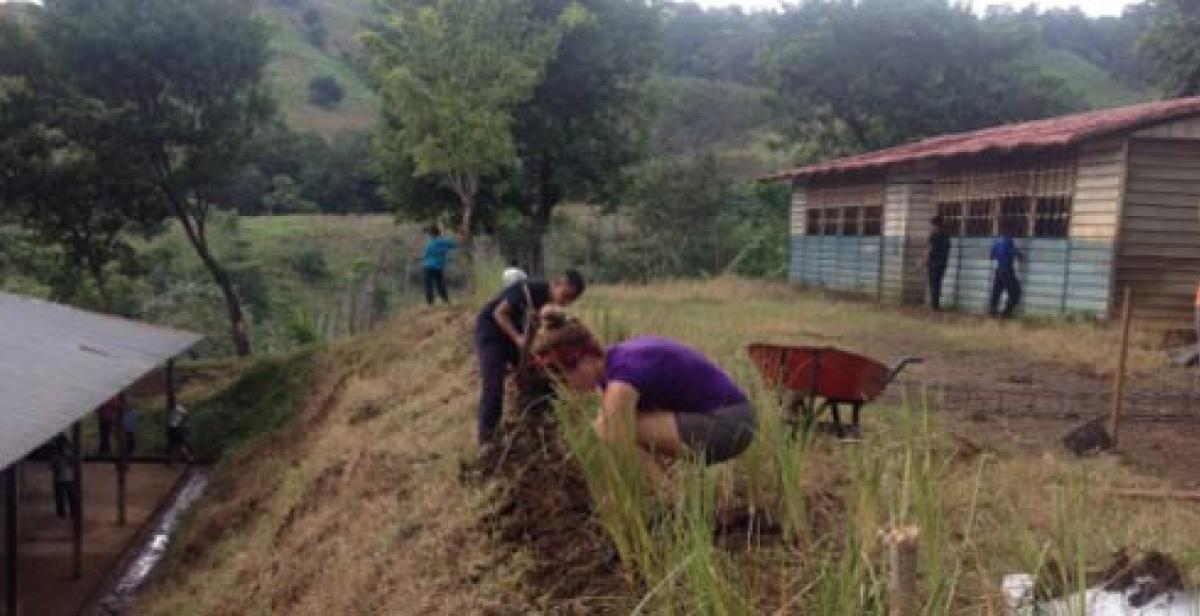International Citizen Service volunteer, Mudabbir Khalid, looks back at his first few weeks working in the El Salvadorian communities of Los Schull and El Escalon
Coming from a working class heritage I’ve always had an earful from my father about not knowing the true meaning of hard work, not knowing what it’s like to have every strip of your muscle ache, working a whole day in the blazing heat to earn nothing more than peanuts, just enough to buy maybe one loaf of bread.
Driving into the community, I couldn’t help but notice the scenic nature it was surrounded by, the views extended all the way down to the coast. As I stared out the window of the coach I envisioned waking up to mountainous scenes every day, and wondering how anyone could even entertain a negative thought whilst engulfed by such surrounding beauty.
The coach slowed down as we arrived at our destination, and to be perfectly honest I was expecting to be living in a much rougher condition than we actually are, and I am forever grateful for all the facilities that we are provided with. Once we were pointed to our respected rooms we decided to go for a stroll around the town to get acquainted with the area, introduce ourselves to the locals who inevitably would have interest in any large group of foreign looking individuals marching through the town in the middle of the road. For me, it was at this moment where the real excitement began. The Casco Urbano (the small town in Santa Catarina Masahuat where we reside), is a small and very homely place, nothing like the busy urban life of London where the 9 to 5 city life can drain an individuals will to wave a friendly hello to any other being on the street. But the welcoming we received from the locals of the town was truly heart-melting.
With the help of the national volunteers we began our expeditions to our allocated communities, either Los Schull, or El Escalon - two communities in which the schools and their surroundings need a lot of work on refurbishing and infrastructure. The walk to both these communities can be lengthy, but the scenes we encounter, an array of mountains stretching as far back as the eye can see, the peaks of which is sometimes encapsulated by grand white clouds gently resting in the skies, make the walk feel like a breeze. Many a times the views have been too glorious, so much so that we forget we’re still walking on rubbly ground and not bouncing on puffy white clouds, ultimately resulting in a minor slip or buckle - could just be Mother Nature’s way of bringing us back to Earth.
As the work got underway, the effectiveness at which the national volunteers were able to work was outstanding. It seemed innate for them, like they were born with hands of steel that would be able to snap a bamboo stick clean in half. However, it didn’t take long to realise that many of them would have been working hard with their bare hands from a young age, collecting rocks, wood and other labouring activities. This was completely different to the life that many of the international volunteers had lived, so inevitably we were not as well equipped with the work as they were. But, as humans do, we learnt, and every international volunteer was doing their best to get out of their comfort zone and immerse themselves in the projects, whether it was pick axing the earth, collecting rocks from the river, or cutting large bamboo sticks for the fences. This is where I began to consider a fraction of the lives my family had lived.
For the rest of that first week, every morning we would take the rubbly yet stunning walk to Los Schull, where we began digging the ground around a tree in the play area, preparing it for the cement wall, preparing the ground around the school for the zacate (lemon grass), and clearing the football ground of all its excess grass. In the afternoons, after a filling lunch from “Mama- Lorena”, we would begin working on the awareness raising projects, such as questionnaires for the local youth, workshops and cleaning campaigns.
Overall, modifying our lifestyles to fit the project plan was a smooth transition, and it wasn’t long before we were subconsciously evolving into the same traditions and customs that welcomed us into this pleasant municipality. It can only be upwards from here.
Photo: International and national ICS volunteers digging away at the ground of a school in Los Schull to plant zacates (lemongrass). Lemongrass helps with the prevention of soil erosion.



